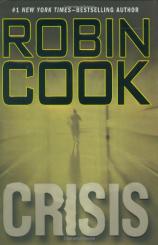Crisis
Review
Crisis
In Boston, Dr. Craig Bowman has the perfect life as he balances
work, a romantic relationship and cultural enrichment, while
remaining at the top of his profession. Who can ask for more? Who
can settle for less? Having left a fee-for-service medical practice
for a successful "concierge" position, Craig is finally able to
enjoy life fully while at the height of his medical career.
Although he provides 24/7 accessibility for his clients, makes
frequent house calls when warranted and offers immediate patient
access, a malpractice lawsuit rears its ugly head.
When Craig's cell phone rings as he dresses for a night at the
Boston Symphony, his life is about to take a serious detour. Jordan
Stanhope, the husband of Craig's wealthy client, Patience Stanhope
(Craig's most annoying hypochrondriac patient), reports that his
wife is experiencing very serious symptoms and that Craig is needed
immediately. It turns out that Craig is about to make his last
house call.
Dr. Jack Stapleton, a medical examiner in New York City and Craig's
brother-in-law, is anxiously awaiting his upcoming wedding a few
short days away. When he is summoned to provide moral support to
his brother-in-law and sister, Alexis, he responds by flying to
Boston for what he assumes will be a couple of days.
CRISIS provides entertainment and mental stimulation. For example,
Patience Stanhope dies of an apparent heart attack after Craig,
knowing her propensity for hypochrondria and her fear of hospitals,
makes a house call en route to the symphony. Craig and his
girlfriend arrive to find Patience appearing much worse than Jordan
had described over the phone. Did Patience commit suicide, or was
she murdered? And if so, by whom and why?
One great aspect of this book is the descriptions of the attorneys.
We see an insurance company attorney who is conservative, well
spoken, and well educated. On the other side we have a
Sopranos-style attorney, complete with a bodyguard and hitmen. What
exactly are the issues under scrutiny by the jury? 1) Concierge
medical practices vs. traditional fee-for-service practices; 2)
Lifestyles of the wealthy; 3) Personal gain vs. patient rights; and
4) Physician decisions made out of convenience.
Although it is in excess of 400 pages, CRISIS reads quickly and is
engrossing. Robin Cook has laid out a rather complex story that at
first blush seems like a yes-or-no malpractice case. Skillfully
crafted with believable characters and a balanced plot with enough
suspense to maintain our interest, CRISIS moves logically and Cook
provides some great surprises here.
Reviewed by Marge Fletcher on December 28, 2010





